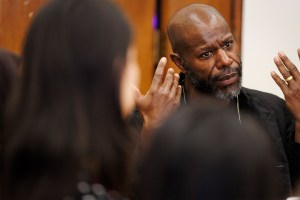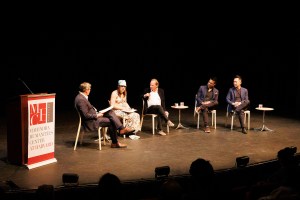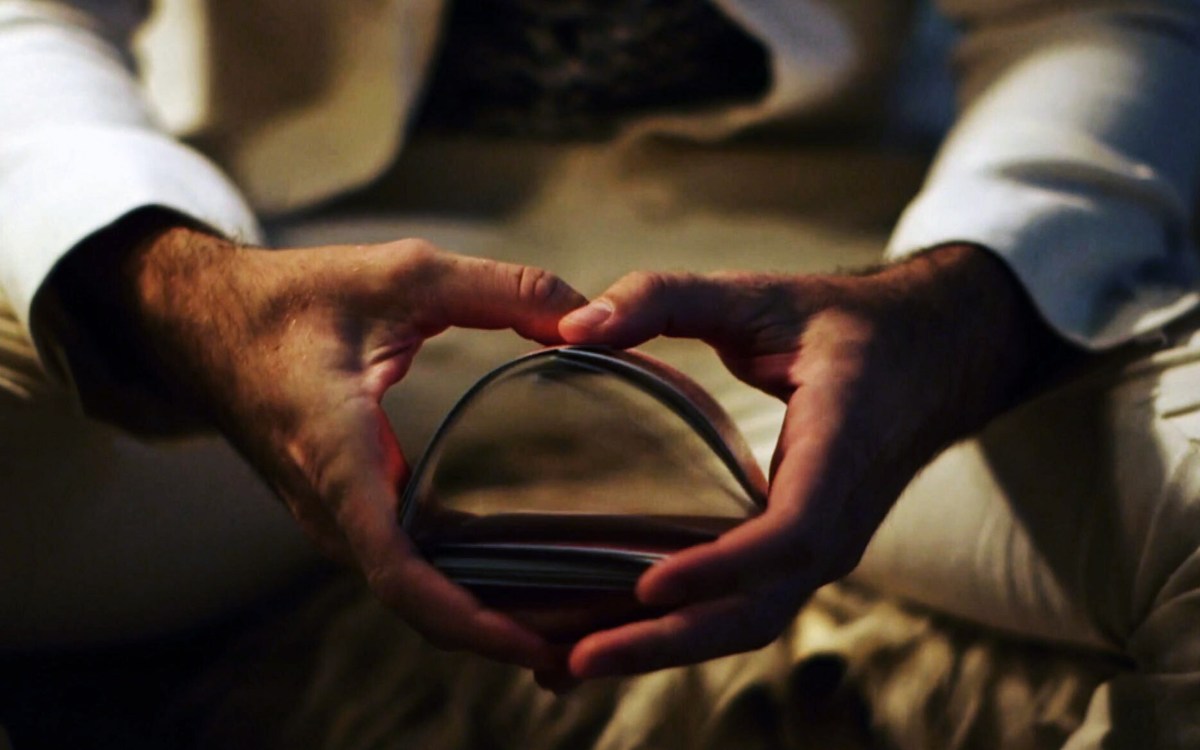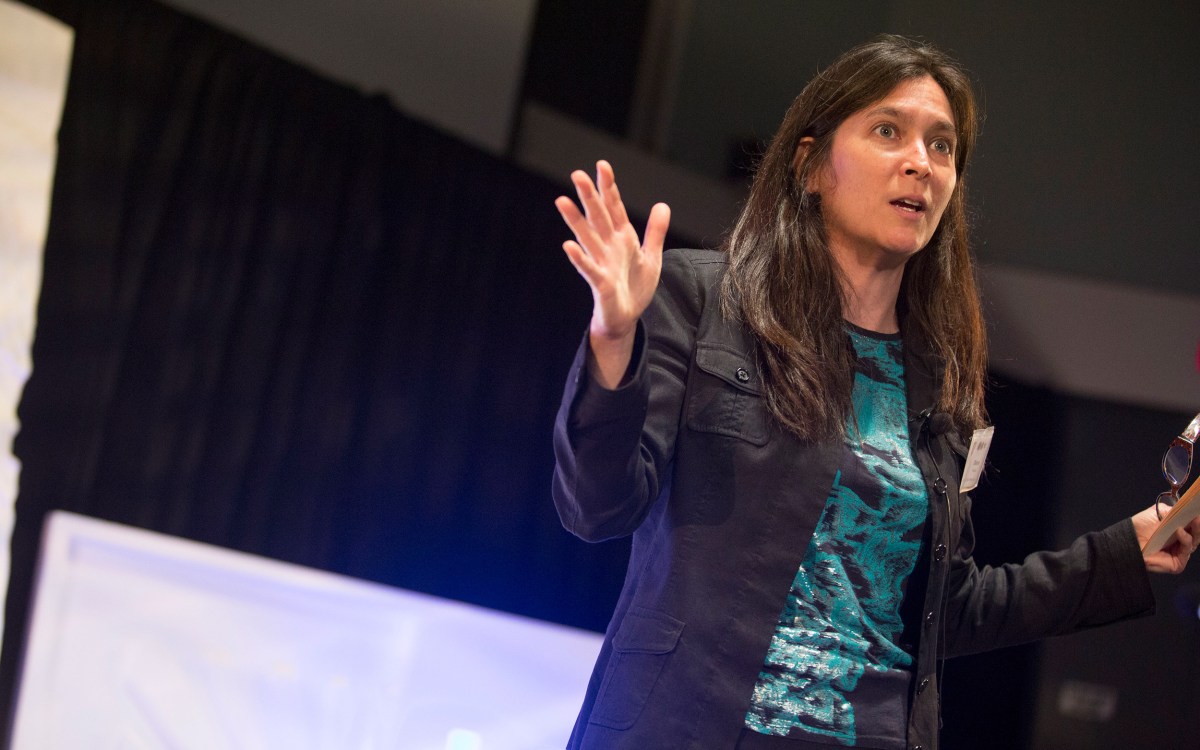
“Jagged Little Pill” will run in Sydney in late summer before the Broadway production reopens in October. Elizabeth Stanley (center on bike) played the role of Mary Jane Healy in both the Cambridge and New York productions.
Photo by Evgenia Eliseeva
A.R.T. maintains global collaborations, with technology and remote coordination
Directors, specialists, and crews Zoom in to help actors and stage productions
The show must go on — mostly virtually but some of it live, with remote help. This spring, as a cautious reopening begins, the American Repertory Theater (A.R.T.) has been focusing on international collaborations, taking lessons from recent A.R.T. productions that managed, against the odds (and sometimes with precise global coordination and precision), to bring live theater back abroad.
The popular A.R.T. Travels events will continue as a virtual series this spring, but the theater is making preparations for some upcoming, in-person performances. And it has some pertinent pandemic-era experience under its belt. On Nov. 24, the company’s revival of “Pippin” opened in Sydney, the first post-COVID production to be staged there after eight months of lockdown.
While several members of Paulus’ team made it to Australia and quarantined, to be able to work directly with the Australian cast, COVID restrictions made staging the musical drama a global effort. “Gypsy Snider, our circus coordinator, was Zooming in from Montreal,” Paulus recalled. Paulus herself arranged remote one-on-one sessions with actors and recordings of rehearsals. “I spent hours on Zoom,” she said. “Crazy hours, because of the time difference.”
Although the cast rehearsed with masks on, by the time the production opened they were able to perform unmasked to a full-capacity, masked audience. “It was the first glimmer of hope that we could be back,” said Paulus.
March saw another foray into the real world, when the A.R.T.’s production of “Waitress” was scheduled to open in Tokyo. “It was quite exciting,” recalled Abbey O’Brien, the show’s associate choreographer, who worked on-site with the Japanese cast. “Theater had been shut down for almost a year. I was thrilled to get back in the rehearsal room and to share this amazing story across the world.”
“The director in London would say, ‘That’s the cue.’ A button would be pressed on the lighting board in a city in America. And then the light would go on onstage in Tokyo.”
Diane Paulus
Of course, the ongoing pandemic managed to complicate every aspect. “We were supposed to travel mid-January to quarantine and then start rehearsals,” said O’Brien. “Right after Christmas we got word that they were going to be closing the borders first week of January. The team called us and asked, ‘Can you fly out in three days?’ It was wild.”
Although O’Brien was joined by music director Ryan Cantwell, Alexandra Sumner-Hughes, who had been tapped to be the on-site director, was not so lucky. Sumner-Hughes, who had served as resident director when “Waitress” played in London’s West End, was based in the U.K., where a dangerous new variant had brought another lockdown. “She couldn’t get out of London,” Paulus recalled. “So she was setting her alarm clock for 2 o’clock in the morning and directing ‘Waitress’ in Tokyo via Zoom, and I was Zooming in from New York.”
One foray in the real world was the March opening of “Waitress” in Tokyo. The cast included LiLiCo (from left), Mitsuki Takahata, and Emma Miyazawa.
Courtesy of “Waitress” Japan.

With so many members of the team locked out, the production worked out the shows technical requirements, such as light and sound, remotely. “The director in London would say, ‘That’s the cue.’ A button would be pressed on the lighting board in a city in America. And then the light would go on onstage in Tokyo,” said Paulus.
The collaboration required intensive coordination. “We had our associate on the ground in Tokyo looking at the light on the stage, saying, ‘That’s not quite right. It should come on slower; the color is wrong. It’s not hitting in the right spot,’” said Paulus. “We had five different channels of communication — Slack, WhatsApp, emails, all different monitors — going back and forth across multiple countries.
“It was crazy,” reflected Paulus with a laugh. “It’s obviously not ideal, but that’s technology, right?” (This Japanese production will be the subject of a June 1 A.R.T. Travels creative roundtable with Paulus, O’Brien, Cantwell, and production supervisor Mahlon Kruse.)
This summer, Paulus will get to direct in person — again abroad — when “Jagged Little Pill” opens in Sydney. Preparations include virtual casting of the all-Australian cast, with Paulus and her team reviewing recordings of hopefuls singing and dancing.
“Typically, in the international theater world, you’re hopping planes. It’s a life of globe-trotting,” she said. “But this is the way things are happening now.”
There are plusses to this new virtual way of functioning. Paulus cites the reduction of emissions, with fewer flights to far-flung productions, and the number and complexity of collaborations made possible by remote technology, as well as the increased audience access via online forums such as the A.R.T. series.
“At A.R.T., part of what we’ve done over the years is take theater out into the world,” she said. “That’s part of our profile: incubating work in Cambridge at Harvard, and then bringing it out nationally and internationally. When you can’t travel, like in the pandemic, the question was: How can we continue fostering the partnerships in an international community? The technology, the creativity, the innovation, and the access have been major learning points.”
With effort, luck, and some amazing technology, Paulus said, the outreach has not only continued, it has been enhanced. “We are a global community in this pandemic,” she said.






